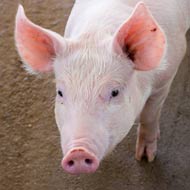Promising advance in fight against African swine fever

African swine fever virus is a devastating and economically important disease of pigs.
Scientists at The Pirbright Institute have made a promising advance in the quest for an African swine fever vaccine.
Writing in the Journal of Virology, researchers describe how they have identified a number of novel immunogenic proteins to test further as vaccine candidates.
“Such an advance is extremely timely due to the continuing spread of ASFV into Eastern Europe,” explained study leader Dr Linda Dixon. “Developing an effective and safe vaccine is therefore of increasing importance to prevent further spread.”
African swine fever virus (ASFV) is a devastating and economically important disease of pigs that is usually fatal. Prevalent in Russia, Sardinia, Sub-Saharan Africa and Eastern Europe, experts have warned that the disease is likely to spread further afield.
There is no vaccine available for ASFV which limits the available options for control. However, researchers at Pirbright have been working on a solution.
Until now, ASF vaccine development work has centred on live attenuated viruses. These are common viruses that have been genetically modified to prevent a full infection, but which can still trigger an immune response.
Although this method is common and effective, scientists say there may be safety issues since the vaccine may cause clinical signs and persist in animals. To overcome this problem, Dr Linda Dixon and her team set out to investigate proteins that induce immune responses that might offer the best protection against infection.
By inserting the gene code for these proteins into Vaccinia - a safe virus that is often used to deliver protective genes to a host - they were able to screen 30 per cent of ASFV genome and ranked 47 genes on their ability to produce proteins that would generate an immune response in pigs.
Researchers say the next step is to test the proteins that had the best immune response and incorporate them into safe vaccines that could eventually be used in the field.



 The RCVS has announced a new version of its 1CPD mobile app, with enhanced features for veterinary surgeons and veterinary nurses to record their continuing professional development.
The RCVS has announced a new version of its 1CPD mobile app, with enhanced features for veterinary surgeons and veterinary nurses to record their continuing professional development.